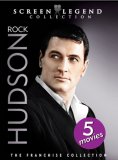| Reviews & Columns |
|
Reviews DVD TV on DVD Blu-ray 4K UHD International DVDs In Theaters Reviews by Studio Video Games Features Collector Series DVDs Easter Egg Database Interviews DVD Talk Radio Feature Articles Columns Anime Talk DVD Savant Horror DVDs The M.O.D. Squad Art House HD Talk Silent DVD
|
DVD Talk Forum |
|
|
| Resources |
|
DVD Price Search Customer Service #'s RCE Info Links |
|
Columns
|
|
|
Rock Hudson Screen Legend Collection
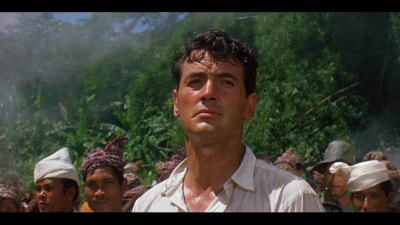
ROCK HUDSON: SCREEN LEGEND COLLECTION
1952, 1953, 1961, 1962, 1965 / color / full-screen, widescreen
Starring: Rock Hudson, Charles Coburn, Piper Laurie, Kirk Douglas, Dorothy Malone, Burl Ives, Leslie Caron, Charles Boyer
Directors: Douglas Sirk, Nathan Juran, Robert Aldrich, Robert Mulligan, Michael Gordon
I was very much looking forward to the Rock Hudson: Screen Legend Collection, from Universal's terrific Franchise Collection line. Not only are the Franchise Collections fun, because they usually gather together quite a few titles for peanuts, but the transfers are, on the whole, quite good, and the title selections are varied and eclectic (some say it's Universal cleaning out their odd, hard-to-sell titles - well, who cares if it is?). If you love movies, discovering the obscure or forgotten titles from a particular screen favorite's film roster can be almost more fun than the well-worn flicks you've seen a hundred times already. Rock Hudson was an incredibly popular movie star (seven years straight as the number one box office draw with the Motion Picture Film Buyer's Poll) who never really received the respect he deserved from critics. He certainly wasn't an Olivier or Grant or Mitchum, but he was capable of giving a good dramatic performance in the right material (Seconds is certainly his best dramatic role, and a genuine masterpiece of the American cinema), as well as being one of the screen's all-time best romantic comedy leads (the three Doris Day parings, particularly Pillow Talk, put him near the top of romantic comedy performers). Unfortunately, the five titles assembled for the Rock Hudson: Screen Legend Collection are lesser efforts by Hudson, showing almost none of the qualities that made him a star in the first place.
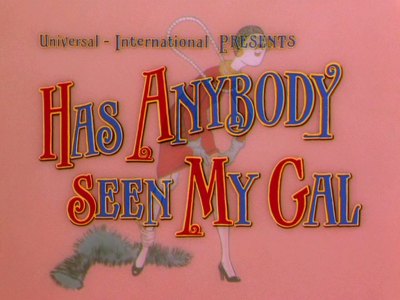
HAS ANYBODY SEEN MY GAL
1952 / 88 minutes / color / full-screen
Starring: Piper Laurie, Rock Hudson, Charles Coburn, Gigi Perreau, Lynn Bari, Larry Gates, William Reynolds, Skip Homeier, James Dean (bit)
Screenwriter: Joseph Hoffman
Cinematographer: Clifford Stine Producer: Ted Richmond
Music: Henry Mancini Director: Douglas Sirk
In Tarrytown, New York, in the late 1920s, wealthy curmudgeon Samuel Fulton (Charles Coburn) is dictating his will, intending to leave all of his money to the family of woman who spurned his love decades ago. On the insistence of his lawyers, Fulton goes to check out the family, to make sure they're worthy of his money. Once in their small town, Fulton tricks his way into becoming the Blaisdell's lodger. Harriet Blaisdell (Lynn Bari) is the daughter of the woman Fulton loved, and her family is a typical, hard-working American family of the Roaring Twenties. Her pert, cute daughter Millicent (Piper Laurie) is in love with poor but honest soda jerk Dan Stebbins (Rock Hudson),who Harriet disapproves of because of his social station; her husband Charles (Larry Gates) runs the pharmacy that Dan works at; son Howard (William Reynolds) is a typical snooty teenager who looks down on his own family; and youngest daughter Roberta (Gigi Perreau) is probably the smartest one of the lot. Into this family comes crusty Fulton, who's determined to help them, even giving them $100,000 anonymously, which of course results in chaos for the family, as well as romantic complications for Dan and Millicent.
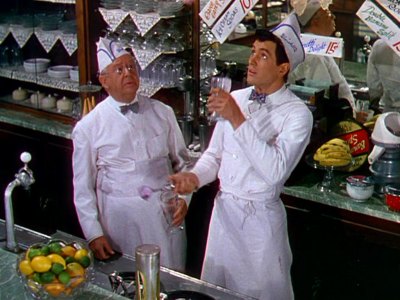
Certainly of interest now for those viewers who want to see the first collaboration of director Sirk and star Hudson, Has Anybody Seen My Gal is a charming little piece of nostalgic fluff that at first glance seems disarmingly quaint and innocuous, but which still has touches of the famous Sirkian world view. While the comedy is slight, but amusing, there's still Sirk's fascination with class conflict in America, and the tensions that mount when family members, thinking in terms of what's right and wrong in the larger community's eyes, decide to inflict their restrictive viewpoints on individuals. Certainly, the mother character would be right at home in a Sirk film such as All That Heaven Allows. Disappointed in her lot in life, she openly belittles her kind husband for being less ambitious than she'd like. Once she comes into money, she immediately disregards her family members' own feelings, dictating what will happen now that the family is flush with cash. Her husband, who's quite satisfied running the store, must now sell it; it wouldn't look good to have a rich man run a dinky little shop. Her beautiful daughter, who's clearly in love with poor Dan, must now be pushed into a relationship with Carl Pennock (Skip Homeier), a creepy skirt chaser from the right side of the tracks. Even her youngest daughter is told she must give up her beloved dog (!) because he's not the right type of pet for such a rich family. It's a frightening character for such a light entertainment (played extremely well by Bari), and Sirk weaves this theme of money, power, as well as family obligation versus societal expectations, expertly.
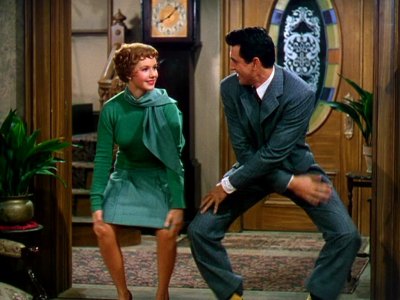
Keeping one's perspective, though, Has Anybody Seen My Gal isn't on the emotional or artistic level of later Sirk films; it's still only a slight comedy that Sirk probably took because he was a contract director for Universal -- he had to direct it. Hudson has a fairly small amount of screen time in the film, and he's less than charming. Hudson acts either grumpy or angry, with little effort made to connect with the audience. However, the girls in the audience loved him, so that's all that counted with Universal, and small parts like this led rapidly to starring leads. Pipe Laurie is quite good in an underwritten part; she's the cat's pajamas walking down the color-soaked street in her flapper skirt and tight sweater (nothing looked better in the 1950s than Universal's primary-colored, saturated hues). But the whole show is Coburn, and he's delightful playing the eccentric, meddling Fulton. He's effortlessly hilarious when trying to get into a speakeasy, and his readings are always on the money. It's not hard, though, with the clever lines he's given by screenwriter Joseph Hoffman. Anyone watching this for Rock Hudson will be disappointed in his small role - and his less-than-enthusiastic playing. It's Coburn's show all the way, and he runs with it. A funny little nothing, with some serious undertones, courtesy of director Douglas Sirk.
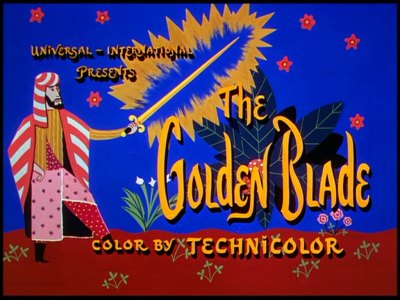
THE GOLDEN BLADE
1953 / 81 minutes / color / full-screen
Starring: Piper Laurie, Rock Hudson, Gene Evans, George Macready, Kathleen Hughes, Steven Geray, Edgar Barrier
Screenwriter: William R. Cox, John Rich
Cinematographer: Maury Gertsman Producers: Leonard Goldstein, Richard Wilson
Music: Irving Gertz, Herman Stein Director: Nathan Juran
During Baghdad's "golden reign," Harun (Hudson), a young, adventurous Basranian lad becomes the catalyst for conflict over a strip of land between Baghdad and Basra. As his father lays dying, Harun is given the medallion that belonged to his father's killer, and he goes in search of vengeance in Baghdad. There, the Caliph (Edgar Barrier) and his evil aid, Jafar (George Macready) are edging closer to open war with Basra - courtesy of Jafar's egging the Caliph on. Jafar plots to overtake the Caliph, with the aid of his son, Hadi (Gene Evans), whom Jafar wishes to marry off to the Caliph's beautiful daughter, Khairuzan (Piper Laurie). But she will have none of it, particularly because she desires Harun. Harun, now armed with the magical Sword of Damascus (which can cut through metal), is also impervious to injury when wielding the sword. Will Harun and Khairuzan find happiness amid the court intrigues, while stopping a full-scale war?
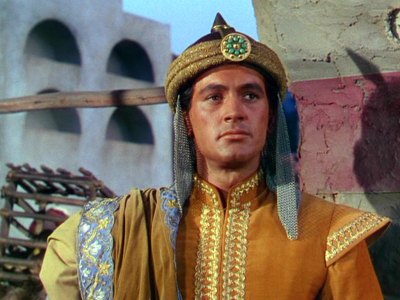
The Golden Blade is exactly the kind of juvenile drivel that was driving movie patrons back home to watch free TV in the early 1950s. That's not to say it isn't executed with a certain amount of style and speed. There's a nice self-awareness with the material; it's clear everyone involved knew they were involved in a strictly camp exercise, and the acting and direction are geared accordingly. It certainly moves along, but after awhile, if you're over 10 years old, you start to laugh at it, not with it. The dialogue is full of overripe whoppers, such as Macready screaming, "Donkeys! Imbeciles! Dogs! Out! Out!" As well, some of the scenes are pitched at such a fevered level (Hudson's strange dope-smoking dream sequence) that it leaves the viewer nowhere to go but into hysterics.
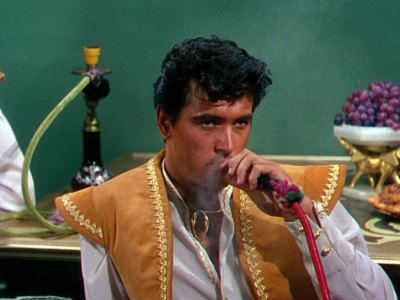
The acting doesn't help much, either, with Hudson certainly game for the action sequences, but rather less effective once he has to actually wield a sword (he has to be one of the least convincing fencers in Hollywood history). He's also rather overstated with the phony romantic poses he must strike with Laurie (the section where she pretends to be a boy -- while trying in vain to suppress her desire for Hudson -- isn't very interesting, despite what we may be looking for in the subtext today). She's a fetching little redheaded minx here (see what watching this movie does to your vocabulary?), but again, she has little to do but flash her eyes at Hudson, and twitch her behind. The production design is colorful and rich (if still chintzy with paste and cardboard prevailing), and helps pass the time between action scenes. With Hudson and Laurie popular with the maltshop crowd, Universal succeeded in executing The Golden Blade exactly as it was intended: an Arabian Nights claptrap designed as Saturday matinee fodder for the teenybopper set. It's entertaining on a juvenile level, but it's no match for other swashbucklers of the same period, and again, no stretch for Hudson.
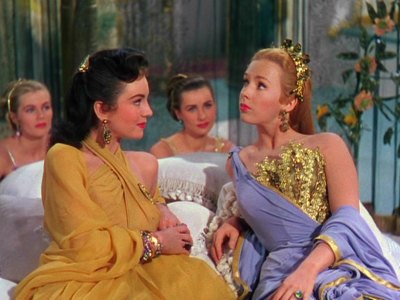
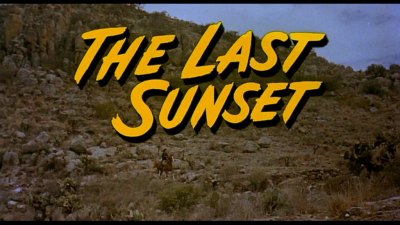
THE LAST SUNSET
1961 / 112 minutes / color / widescreen
Starring: Rock Hudson, Kirk Douglas, Dorothy Malone, Carol Lynley, Joseph Cotton
Screenwriter: Dalton Trumbo
Cinematographer: Ernest Laszlo Producers: Edward Lewis, Eugene Frenke
Music: Ernest Gold Director: Robert Aldrich
Of all the films offered in the Rock Hudson: Screen Legend Collection, The Last Sunset offered the highest hopes of success for me. With Robert Aldrich, the brilliant director of such classics as Whatever Happened to Baby Jane?, The Dirty Dozen, and Kiss Me, Deadly, working from a script by legendary screenwriter Dalton Trumbo (Spartacus), and heavyweights co-stars Kirk Douglas, Dorothy Malone, and Joseph Cotton along for the ride, The Last Sunset seemed sure-fire. It wasn't, unfortunately. The Last Sunset is a dismal, turgid failure.
Bren O'Malley (Kirk Douglas), a derringer-toting gunslinger wanted for murder, has tracked down his long-lost love, Belle Breckenridge (Dorothy Malone), at her Mexican ranch that she shares with her older, weakling husband John (Joseph Cotton), and her 16-year-old daughter, Missy (Carol Lynley). Recognizing his past jealous behavior, and his violent temper, Belle wants nothing to do with Bren. However, she can't stop Bren from drawing uncomfortably close to her daughter Missy, nor can she stop her husband John from hiring Bren to help run his herd of cattle to the U.S. border. Bren promises that not only will he take away John's wife, but that a top trail boss will soon come to help out: Dana Stribling (Rock Hudson). Bren knows this because he's seen Dana on his trail for some time, and knows he will eventually find him. Dana has good reason to track Bren: Dana feels Bren's responsible for the murder of his brother-in-law, and the subsequent suicide of his sister.
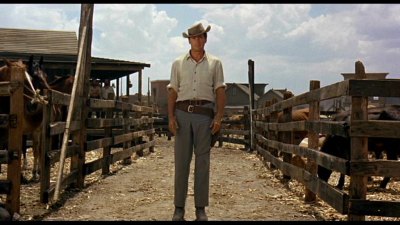
(Spoilers) Along the cattle drive, John is humiliated and killed in a Mexican cantina. This sets the stage for Dana to make his intentions known to Belle. They fall in love, much to the consternation of Bren. Both men promise to kill each other once the cattle are delivered to their destination. After steadily getting closer to Missy, and finally declaring his love for her, Bren is stunned to find out from Belle that Missy is in fact his biological daughter. Rather than tell her the truth, he goes out to a final shoot-out with Dana, with the implication being that he allows himself to be sacrificed for his incestuous relationship.
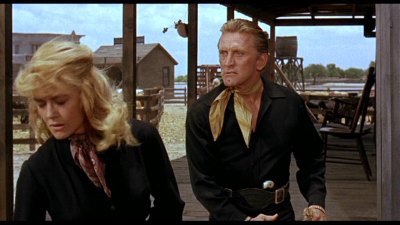
The Last Sunset is a good example of lightening not striking twice in the same spot. It probably seemed like a lock for Douglas to again hire Dalton Trumbo to deliver a thoughtful, intelligent take on the action genre (Douglas's own company produced The Last Sunset), as Trumbo did with Douglas' Spartacus the previous year. However, the virtues present in that marvelous film become lead weights around the actors here. The chief complaint with The Last Sunset is the unimaginably long time it takes for the final shoot-out to appear. The viewer is subjected to endless exposition scenes of Douglas waxing poetically (as well as singing several times) about big themes such as Life and Love and Loss and Death, to the point that he seems more like the Jay Gatsby of the Prairie rather than a vicious killer. Where's the crude, vital energy that Aldrich usually brings to his films? Instead, we suffer through sequence after sequence of Douglas talking and talking, alternating with shots of cows on the march. It also doesn't help that many of The Last Sunset's scenes are done on patently phony indoor sets; over half of the film was shot on exterior mock-ups, and they lend a sense of disbelief to the proceedings. Technical credits aren't up to snuff, either, particularly during the climatic shoot-out. Douglas leaves Lynley to go confront Hudson, promising to come back before the rapidly setting sun goes down (an insert shows a darkening sky, with the sun almost below the hills), but when Douglas immediately heads into town to meet Hudson, it's a startlingly bright, sunny day -- at about high noon.
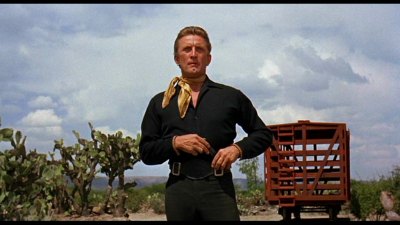
The acting styles are as mismatched as some of the shots in The Last Sunset. Douglas' usual intensity is strangely muted here in deference to the character's affected romantic world view, while Hudson can't manage to develop a character that in any way stands equal to Douglas (certainly the script doesn't help him). He just doesn't sound believable when he's talking tough to Douglas. The central premise of the film is flawed; we never really believe that these two deadly enemies would so blithely go about working together on a cattle drive, before promising to kill each at its finish. As for the more sensationalistic aspect of the script -- namely the incestuous relationship between Douglas and Lynley -- it's clear that the film intends you think that indeed, Douglas and Lynley slept together. But whether due to the restrictions of the Production Code at the time, or simply in a failure to adequately address the issue in the screenplay, the stunning revelation isn't so stunning, nor is it sympathetically played out. It's difficult for the audience to keep Douglas in their plus column, when he's suggestively lying in a haystack, cuddling with his daughter -- after he finds out she's his daughter. Yet, Trumbo and Aldrich obviously want us to believe that Douglas' actions are noble, in some way, and that his self-sacrifice is one of expediency in saving her feelings, rather than for transgressing society's most sacred taboo. Frankly, that's an impossible sell for the audience.
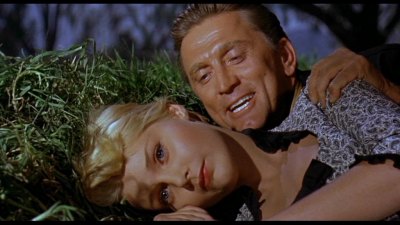
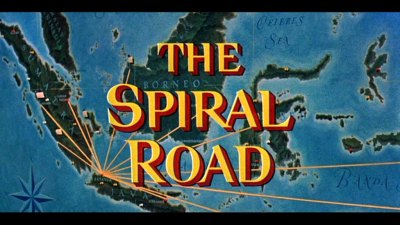
THE SPIRAL ROAD
1962 / 145 minutes / color / widescreen
Starring: Rock Hudson, Burl Ives, Gena Rowlands, Geoffrey Keen, Karl Swenson
Screenwriters: John Lee Mahin, Neil Paterson
Cinematographer: Russell Harlan Producer: Robert Arthur
Music: Jerry Goldsmith Director: Robert Mulligan
Into the Netherlands's colonial East India, in the mid-1930s, comes young, ambitious, arrogant Doctor Anton Drager (Rock Hudson). He is repaying his government sponsored education by serving five years in the Government Health Field. Once there, his sole ambition is to work with Doctor Brits Jansen (Burl Ives), a legendary pioneer in the field of leprosy, who refuses to compile his notes on the subject. Drager intends to learn from Jansen everything he knows about the disease, so he can become an important figure, both medically and politically, back home. But Jansen is skeptical of this young upstart, and makes it difficult for Drager when he first arrives. It doesn't help that Drager is an arrogant atheist, who despises the weaknesses in people -- and in their reliance on religious faith. Jansen's best friend is Willem Wattereus (Geoffrey Keen), a Salvation Army Captain who runs a jungle sanctuary for leprosy patients, and whose wife also suffers from the disease. Through many outbreaks of diseases throughout the islands, Drager eventually wins Jansen's trust and marries his sweetheart from home, Els (Gena Rowlands), while compiling Jansen's notes behind his back. Jansen rejects Drager's callous excuses for compiling the notes (for ambition and fame, not for humanity), and refuses to work with him any longer.
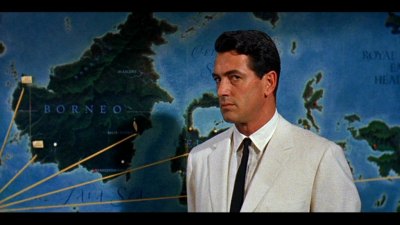
(Spoilers) Drager goes into a steep emotional decline, taking up with a native girl and drinking heavily while waiting for his replacement. With his marriage in trouble, Hudson agrees to go up river and try to rescue a fellow doctor, Frolick (Philip Abbott), who has been the victim of witchcraft, practiced by Burubi (Reggie Nalder), a shaman who wants the colonial doctors out of his country. Once there, Drager is forced to kill the now-insane Frolick. Another doctor, Sordjano (Will Kuluva) becomes the victim of Burubi's tactics, and disregarding orders from the head office to shut down his jungle station, Drager continues on alone at Sordjano's place, hoping to test his strength of character against witchcraft, man, and God. After many weeks at the hands of the mental torture of Burubi's tricks, Drager finds himself half-insane, finally asking for God's help. At that moment, Jansen and the rest of his collegues rescue Drager. He has now found love of God and man, and humbled himself before both.
Yes, The Spiral Road plays just as badly as that reads. A big, sprawling, overlong, gloppy mess, The Spiral Road seems to want to travel down the same path that The Nun's Story did back in 1959. However, that sensitive, realistic film managed to convey all of the nuances and subtleties of religious questioning, packaged in a blockbuster epic, that The Spiral Road botches from the outset. Again, a large part of the problem is the serious miscasting of Hudson as the arrogant, God-hating doctor. At this point in his career, Hudson just didn't have the necessary training to pull off this difficult anti-hero role (something that Paul Newman or William Holden could have pulled off with ease). Her performance is all surface posturing, and it would take a few years -- and too many romantic comedy roles for his own good -- before Hudson had access to his own anger and sadness to attempt such a role (which he did magnificently in Seconds). Burl Ives isn't much better, going to the "Big Daddy" well one too many times here. It's a performance we've seen too often with Ives, and it fails to register much more than weary familiarity.
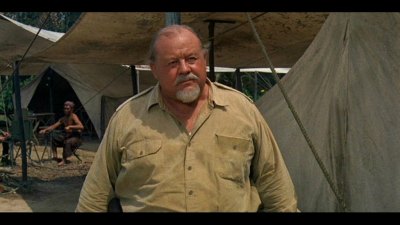
Making matters worse for the actors is a disjointed, unfocused screenplay that undermines the very message it intends to send out to the audience. Where is the compassion in the depiction of the natives that make up the backdrop of The Spiral Road? After all, this is a film about doctors combating horrendous diseases; where are the recipients of this aid? There's real condescension in how we're shown the various natives -- particularly an insultingly comedic stereotype called Stengo, who's treated rather badly by the director and screenwriter (at one point, they dress him up as woman, to dance like a pet for his white masters). How did this happen from the director whose previous film was To Kill a Mockingbird? We know that Hudson is supposed to be a cold-hearted creep who cares for no one other than himself, but does the movie have to be the same way? We are given absolutely no feeling for the culture of the people who are supposedly the object of all the main characters's actions, so what's the point of the film? If we can't view them as real human beings, are they therefore less important than the main characters, who struggle with their personal failings? There's not one fully dimensional native character in the film -- not one. They're nothing but "local color" for the cliched emotional strainings of the main leads.
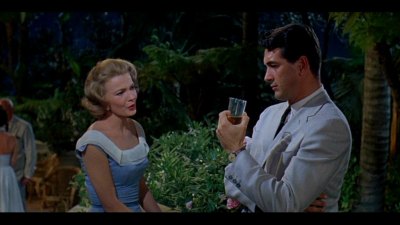
Besides the thematic limitations of The Spiral Road, there are more basic problems of tone and rhythm that director Mulligan can't seem to handle. It's a terribly long film, with no sense of pace or drive. Scenes play out at a desultory level, with the same two or three variations played over and over again, later on in the film. It's a fairly boring film to look at, as well, with static compositions framed against close-up jungle foliage that, if they were indeed shot on location, somehow miraculously turned out looking like studio mock-ups. Time frames for various plot lines are also fudged, with Hudson sporting a full growth of beard several times, which would have taken months to grow, but which translate into weeks in the script. With Hudson raging against himself at the climax of the film, looking like caveman Alley Oop, it's almost impossible to take The Spiral Road as seriously as it does itself.
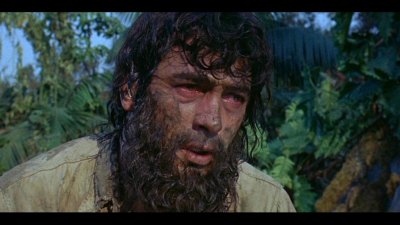
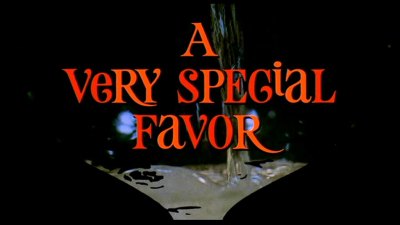
A VERY SPECIAL FAVOR
1965 / 105 minutes / color / widescreen
Starring: Rock Hudson, Leslie Caron, Charles Boyer, Walter Slezak, Dick Shawn
Screenwriters: Nate Monaster, Stanley Shapiro
Cinematographer: Leo Tover Producers: Robert Arthur, Stanley Shapiro
Music: Vic Mizzy Director: Michael Gordon
It's all very simple. You see, Michel Boullard (Charles Boyer), a French lawyer, is returning to the United States to meet his daughter who he hasn't seen in 25 years. Just prior to his plane trip, he lost a case against an American oil company because the "troubleshooter" the oil company called in, Paul Chadwick, slept with the gorgeous female judge presiding over the court. Impressed with his savoir faire (Boullard also spots Chadwick calling two girls at the same time, making dates with them), Boullard offers his congratulations to Chadwick (they're sharing the same flight home), as well as getting a promise of help from Chadwick, should Boullard need anything in the States.
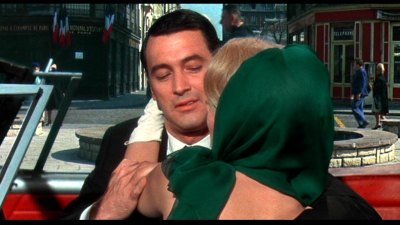
Boullard then goes to see Lauren (Leslie Caron) at his daughter's office -- she's a famous psychologist -- and overhears how controlling she is towards her milk sop boyfriend, Arnold Plum (Dick Shawn). After speaking with Arnold, Michel realizes that his daughter is not only a virgin, but also an authoritative woman who needs, in the best French tradition, to be knocked down a peg or two. His brilliant plan? To beg ladykiller Chadwick to seduce his daughter and give her "the fulfillment of a woman." Thanks, Dad! Of course, myriad complications arise, foremost; Chadwick must pretend to have seduced Lauren several times (by getting her drunk and then having her wake up in his bed naked -- even though nothing happened). Naturally, she finds out -- inexplicably by Michel -- and turns the tables on Chadwick, by pretending to be a loose woman, and thereby making him feel insecure and impotent. Further complications arise (the kind found in the typical 1960s sex farce), before the happy fade-out.
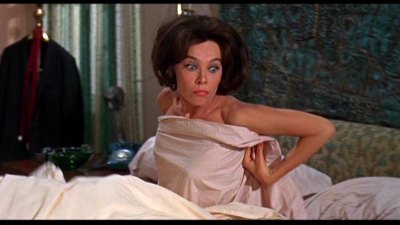
It's not hard to see, after watching A Very Special Favor, that Rock Hudson became insanely bored with playing romantic comedy leads in films. That very year, he would lobby to star in the black and white masterpiece, Seconds, directed by John Frankenheimer, in a bid to break free of his self-imposed stereotyping (it didn't work; Seconds was an utter, complete flop at the box office). It's not that A Very Special Favor is a particularly bad example of the 1960s innocent/naughty sex farce; it's just that it's something that 1965 audiences had already seen, time and again, and they tuned it out completely. It has a disagreeable, nasty center, as well, which is hard to swallow. The sight of Charles Boyer, begging a Lothario to basically deflower his own child, while trying to convince Hudson it's worth it by describing her like a horse ("Excellent teeth!"), very probably made 1960s audiences just as queasy as today's. Some of the work is good in A Very Special Favor. Certainly, Boyer is always interesting, despite the rancid part he has to play. Hudson acquits himself well enough, too (even though he could do this part in his sleep). He's clearly not engaged by the material, but he shows up, and delivers his lines competently, which is more than can be said for Caron. She seems uncomfortable right from the start; perhaps she realized how far her career had fallen, co-starring in lame material like this (also, can someone please explain why she has a French accent, when her mother was supposed to be American, and she moved to the States when she was only five?).
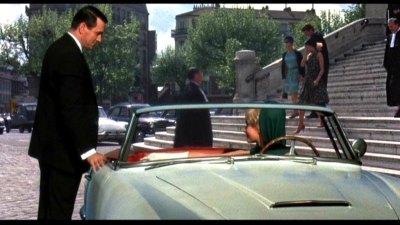
This is basically FantasyLand, 1965, where the jokes all center on either harried husbands who fear and despise their battle-axe wives, or handsome, rich playboys who have harems of women willing to be their slaves (Hudson has two women who come in and do his laundry and cook his breakfast, for which they're paid, we assume, with sex). I don't have a particular problem with certain situations being the subject of a comedy, but if you're going to go with something like this kind of fantasy, at least make it funny enough for me to get over the rough spots. Technical problems abound in what many critics at the time called a lush production. The sets look incredibly cheap, along with some questionable, dark lighting. Most amazingly, there's some of the worst process shots I've ever seen in a major motion picture; the opening scenes, where Rock gets out of the French judge's car, are truly, amazingly, inept. There's literally a large, black outline around his body, against the front projection. Similarly, there's a scene where Boyer is driving in a convertible, and they forgot to foley in any ambient background noise. He sounds like he's speaking in a closet, but not a hair is blown out of place, and not a car horn is heard, as they speed along the highway. In a film like this, I want to feel that I'm being taken care of by pros who will give me my money's worth; director Gordon (who did the sensational Pillow Talk with Hudson and Doris Day) would seem like a reassuring hand on this kind of material. But sadly, it's not to be. Even the introduction of a veiled homosexual subplot, written into the script no doubt, as an obvious gag that no one in 1965 would suspect of Rock, fails to ignite any sensationalistic interest. I can't imagine Hudson, who was famously closed-mouthed about his homosexuality, was comfortable enacting a sequence where he kisses a woman dressed as a man, but that's the level of "shock value" that's offered in A Very Special Favor, and today, as in 1965, it fails to register more than a yawn.
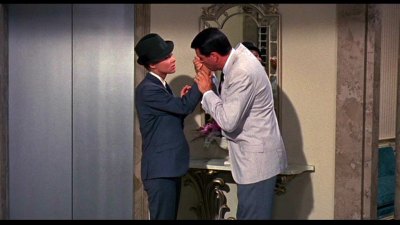
The DVD:
The Video:
The prints used for the five titles in the Rock Hudson: Screen Legend Collection look better than other TV prints I've seen, particularly The Last Sunset and A Very Special Favor. However, that doesn't mean that the transfers are pristine by any means. Dirt, scratches, and some heavy grain at times indicate that these were not restored; still, they look much better than you've seen them before. The widescreen titles are anamorphic.
The Audio:
The audio tracks for all five films are a serviceable Dolby Digital 2.0 Mono. While certainly not spectacular, the tracks do accurately reflect the original sound of these films when first premiered at the theatres. There are English and French subtitles available.
The Extras:
As anyone who has ever bought one of the Universal Franchise Collections knows, trailers are about the only extras you can expect. It's no different for the Rock Hudson: Screen Legend Collection. There are only two trailers included here, for The Golden Blade and The Last Sunset. That's it. Surely somewhere there are trailers for the other three films. I understand the concept of the budget-line Franchise Collection, but come on -- trailers are pretty basic extras.
Final Thoughts:
As much as I wanted to discover some hidden, forgotten gems here, I can only really recommend one title in the Rock Hudson: Screen Legend Collection: director Douglas Sirk's Has Anybody Seen My Gal? -- and that's Charles Coburn's film, not Rock's. The other four films range from mediocre to downright terrible, so I can only recommend that you rent individual titles from NetFlix for the Rock Hudson: Screen Legend Collection -- if you're so inclined. Otherwise, skip it.
Paul Mavis is an internationally published film and television historian, a member of the Online Film Critics Society, and the author of The Espionage Filmography.


|
| Popular Reviews |
| Sponsored Links |
|
|
| Sponsored Links |
|
|
| Release List | Reviews | Shop | Newsletter | Forum | DVD Giveaways | Blu-Ray | Advertise |
|
Copyright 2024 DVDTalk.com All Rights Reserved. Legal Info, Privacy Policy, Terms of Use,
Manage Preferences,
Your Privacy Choices | |||||||









